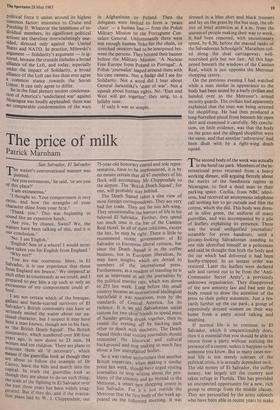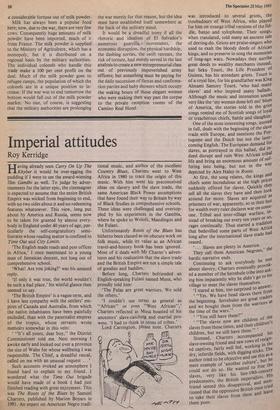The price of milk
Patrick Marnham
San Salvador, El Salvador The waiter's conversational manner was pointed.
'Are you extraneous,' he said, 'or are you of this place?'
'I am extraneous.'
'I thought so. Your comportment is very recto, and how the strengths of your character shine from your face.'
'Thank you.' This was beginning to sound like an expensive lunch. 'Are you, by chance, Swiss? We, the i waiters have been talking of this, and it is our conclusion.' 'No. I am English.' 'English! Son of a whore! I would never have taken you for English from England.' 'Why not?'
'You are too courteous. Here, in El Salvador, it is our experience that those from England are brusco.' We simpered at each other as courteously as we could, and I prepared to pay him a tip such as only an extraneous of my comportment could af- ford.
I am not certain which of the brusque, gallant and battle-scarred survivors of El Salvador's British community can have so seriously misled the waiter about our na- tional character, but I suspect it may have been a man known, though not to his face, as 'the British Death Squad'. The British community, which numbered over 300 four Years ago, is now down to 23 men, 34 women and ten children. There are plans to evacuate them all 'if necessary', which means if the guerrillas look as though they are about to follow the example of Dr Castro, leave the hills and march into the capital. In truth the guerrillas look as though they are about to do no such thing; the scale of the fighting in El Salvador over the past three years has been widely exag- gerated. But if they do, and if the evacua- tion plans laid by W. J. Chippendale, our 75-year-old honorary consul and sole repre- sentative, have to be implemented, it is by no means certain that all 67 members of his flock will accompany Mr Chippendale to the airport. The 'British Death Squad', for one, will probably stay behind. The Death Squad takes a dim view of most foreign correspondents. They are very bad for trade. They are far too left-wing. They sensationalise the horrors of life in his beloved El Salvador. Further, they spend too much time in the bar of the Camino Real Hotel. In all of these criticisms, except the last, he may be right. There is little to recommend recent governments of El Salvador to European liberal opinion, but since the Death Squad is in the coffee business, not in European liberalism, he may have insights which are denied to members of the international press. Furthermore, as a resident of standing he is not as impressed as are the journalists by the political murder rate, which was down to 253 last week. Long before this small country became an international ideological battlefield it was notorious, even by the standards of Central America, for its violence. It is an old Salvadorean social custom for two close friends to spend most of Sunday getting drunk together, then to round the evening off by hacking each other to death with machetes. The Death Squad thinks that visiting journalists should remember the historical and cultural background and stop making so much fuss about a few unexplained bodies.
So it was rather unfortunate that another British expatriate, when making a similar point last week, should have urged visiting journalists to stop writing about the pro- blems of the country and go instead to the Metrosur, a smart new shopping centre in San Salvador. For it is just outside the Metrosur that the first body of the week ap- peared on the following morning. It was dressed in a blue shirt and black trousers and lay on the grass by the bus stop, the ob- ject of brief attention at 8 a.m. from the queues of people making their way to work. It had been removed, with uncustomary speed, by 8.30, before the massed ranks of the Salvadorean Schoolgirls' Marathon toil- ed along the dual carriageway; well- nourished girls but not fast. All this hap- pened beneath the windows of the Camino Real, which is just opposite the Metrosur shopping centre.
On the previous evening I had watched while a man similar in appearance to the body had been seized by a burly civilian and handed over to the Metrosur's armed security guards. The civilian had apparently explained that the man was being arrested for shoplifting. He had then produced a long-barrelled pistol from beneath his open shirt and examined it carefully. My conclu- sion, on little evidence, was that the body on the grass and the alleged shoplifter were the same, and that another 'subversive' had been dealt with by a right-wing death squad.
The second body of the week was actually in the hotel car park. Members of the in- ternational press returned from a heavy working dinner, still arguing fiercely about the merits of the Sandinista regime in Nicaragua, to find a dead man in their parking space. Cecilia, from NBC televi- sion, had received an anonymous telephone call inviting her to go outside and film the corpse, which she did. This body was dress- ed in olive green, the uniform of many guerrillas, and was accompanied by a pile of leaflets explaining its presence. There was the usual undignified journalists' scramble for press handouts, until a gloomy-looking Salvadorean standing to one side identified himself as a policeman and said he thought that both the body and the car which had delivered it had been booby-trapped. In an instant order was restored. Later the leaflets were declared safe and turned out to be from the 'Anti- Communist Secret Army', a previously unknown organisation. They disapproved of the new amnesty law and had sent the body round to draw the attention of the press to their policy statement. Just a few yards further up the car park, a group of expensively dressed women on their way home from a party stood talking and laughing.
If normal life is to continue in El Salvador, which it unquestionably does, then it is essential that you should be able to return from a party without noticing the presence of a corpse, unless it happens to be someone you know. But in many cases nor- mal life is not merely tolerant of the political crisis, it is actually dependent on it. The old money of El Salvador, the coffee money, has largely left the country and taken refuge in Florida. This has provided an unexpected opportunity for a new, rich group to emerge from the middle classes. They are personified by the army colonels who have been able in recent years to make a considerable fortune out of milk powder.
Milk has always been a popular food here; now, due to the war, there are very few cows. Consequently huge amounts of milk powder have been imported, much of it from France. The milk powder is supplied to the Ministry of Agriculture, which has a monopoly, but it is distributed on a regional basis by the military authorities. The individual colonels who handle this trade make a 100 per cent profit on the deal. Much of the milk powder goes to refugee camps, the population of which the colonels are in a unique position to in- crease. If the war was to end tomorrow the bottom would fall out of the milk powder market. No one, of course, is suggesting that the military authorities are prolonging the war merely for that reason, but the idea must have established itself somewhere at the back of the military mind.
It would be a dreadful irony if all the rhetoric and idealism of El Salvador's numerous guerrilla movements, the economic disruption, the physical hardship, the dashing sorties, the swift retreats, the risk of torture, had merely served in the last analysis to create a new entrepreneurial class out of previously impoverished army officers; but something must be paying for the daily succession of fiestas and confirma- tion parties and baby showers which occupy the waking hours of those elegant women who were making their way past the corpse to the private reception rooms of the Camino Real Hotel.















































 Previous page
Previous page